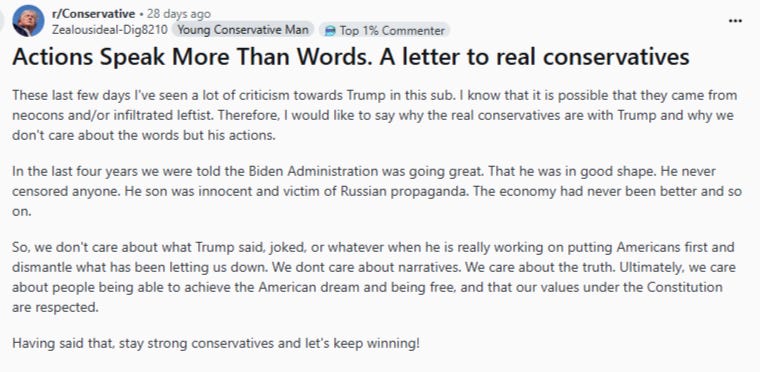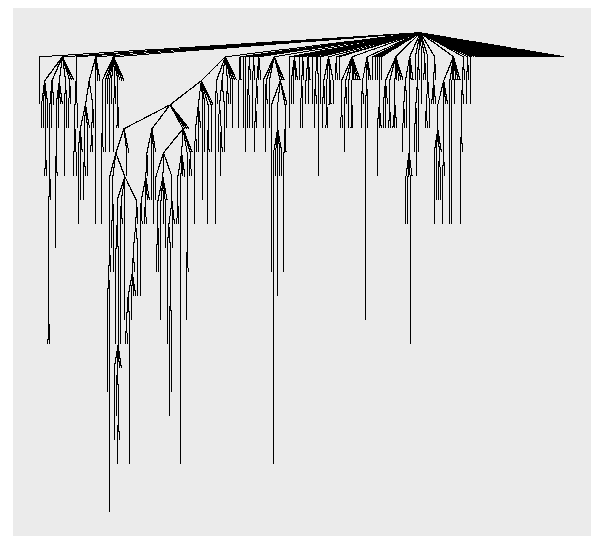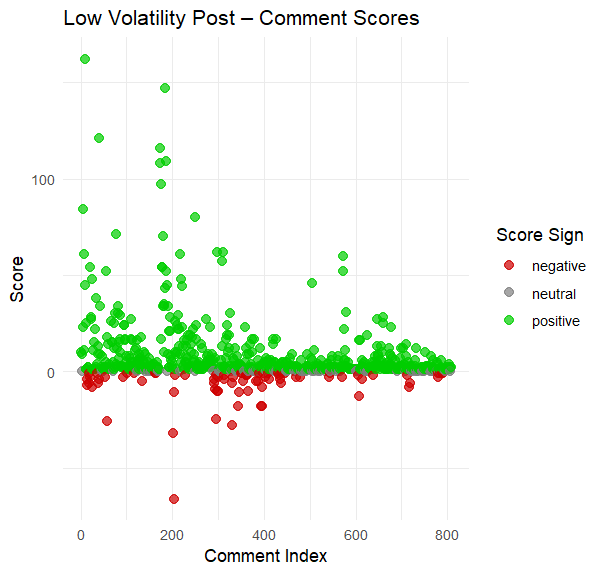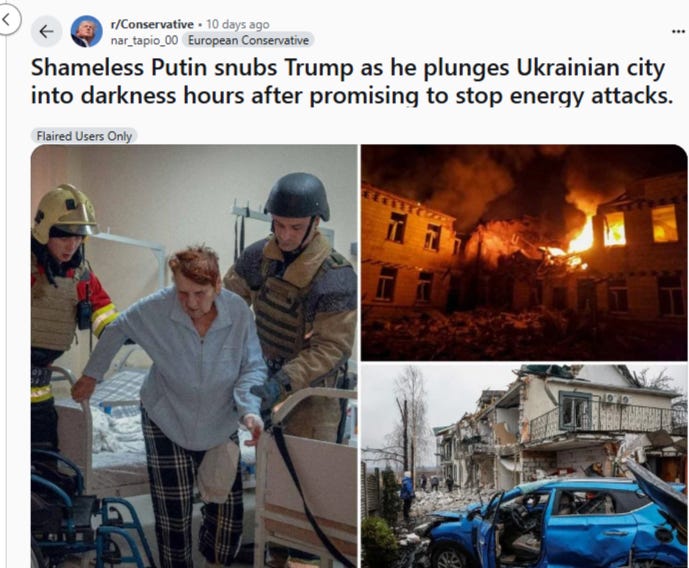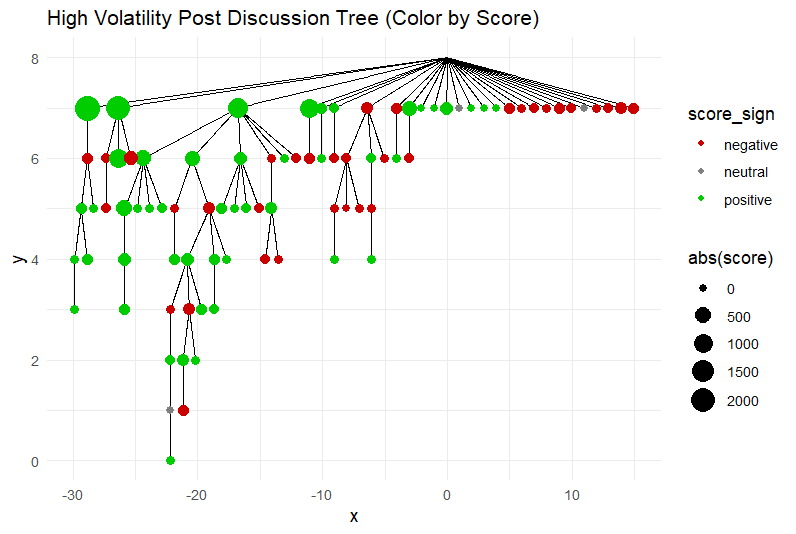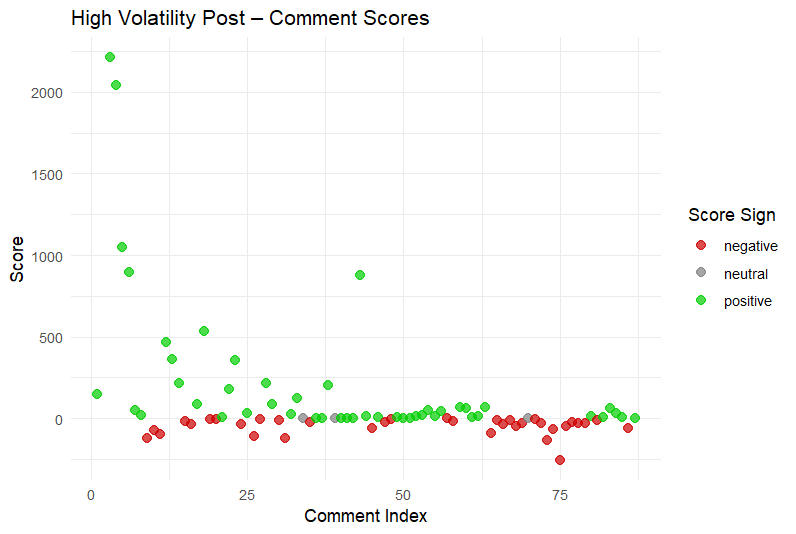Conversation Cascade Analytics: r/conservative
Writeup of initial results from conversation cascade analysis prototype for side project analyzing discourse in r/conservative
Introduction:
This report is part of an independent side project analyzing discourse from the subreddit r/conservative vis a vis U.S. aid to Ukraine and U.S.-Ukraine foreign relations. This report presents a prototype analysis of Reddit discourse on U.S. aid to Ukraine within the r/conservative subreddit. The project explores how political alignment, disagreement, and controversy shape the structure and tone of online discussion. Rather than relying only on post and comment counts, this analysis visualizes and quantifies the structure of engagement by treating Reddit comment threads as conversation cascades—tree structures that reveal how users interact beyond surface-level reactions.
Computationally, I built a PostgreSQL database populated via a custom scraper using the Reddit API. Posts were filtered by a keyword list related to Ukraine and Russia. For each post, all available comments were recursively retrieved, flattened, and stored along with metadata including parent-child relationships, authorship, and scores. Data processing and analysis were conducted in Python and R.
Key metrics include comment frequency, score distributions, and comment tree depth. Two posts were selected for focused analysis by merit of their low and high score volatility (measured by their score, which is a function of upvotes minus downvotes), suggesting broad alignment or cohesion amongst users in the comment threads below each post. Visualizations illustrate how topical contention affects not just what users say—but how they say it together.
Key Takeaways:
High-volatility threads reflect high deviation amongst comment scores and tend to be structurally shallow. Topically, these threads may more likely cover current events such as the specifics of Russo-American relations.
Low-volatility threads are deeper, reflecting in-group cohesion and extended dialogue. Topically, these posts may more likely be meta-commentary about conservatism and in-group sentiment or behavior.
Anti-Putin comments were highly upvoted in the most volatile post thread, which claimed Putin “snubbed” Trump by continuing energy attacks on Ukraine.
Dataset Summary
As of March 26th 2025, this dataset covers discussions on Ukraine in r/conservative from March 3rd, 2025 to March 26th, 2025. The database contains 153 posts and 4694 comments. The keyword search used to scrape comments consists of the following keywords:
KEYWORDS = ["russia", "ukraine", "putin", "zelenskyy", "nato", "ukraine war", "war in ukraine", "pro-ukrainian", "pro-ukraine", "aid to ukraine", "ukraine aid", "foreign aid", "ukrainian aid"]
Conversation Cascade Analysis
For a conversation cascade analysis, I identified the most and least volatile posts in the dataset, measured by the standard deviation of comment scores ( a function of up and down votes) beneath posts. I visualized the full structure of the comment threads as conversation cascades — directed trees where each node represents a comment and each edge represents a reply.
This structure offers insight into the shape of discourse, showing the depth of discussions, how many distinct threads emerge (branching) and where the most upvoted comments appear in the conversational hierarchy.
By comparing the high-volatility post with the low-volatility post, we can assess how contention regarding posts amongst users impacts the shape of discourse. My initial results indicate an intuitive reality: less volatile discussions go deeper, while more volatile discussions stay shallow.
Least Volatile Post
The post titled "Actions Speak More Than Words. A Letter to Real Conservatives” is an appeal to the ingroup, and comments show clear signs of it’s functionality in fostering in-group cohesion (figure 1). The author frames dissenting voices in the subreddit as illegitimate, suggesting critics of Trump in the subreddit are “neocons” or “infiltrated leftists.” While this post contained the keyword “russia”, the content of the post is not focused on Russia or foreign policy. While U.S.-Ukraine/Russia foreign policy is the intended analytic focus of this overall project, analysis of this low-volatility post is sufficiently interesting that we will overlook this diversion from the initial project intent. The posts contained so many comments, that the only way to visualize the discussion was with a zoomed out tree. Here is the tree viz representing the comments below the “actions speak more than words…” post (figure 2).
The structure of the conversation tree reflects a few interesting attributes. The comment tree is deep with several significantly lengthy branches. These long reply chains, rather than simply showing many fragmented shallow branches, suggests a comment ecosystem where users engage in extended back-and-forth. The upvote/downvote score distribution is tightly clustered; while several comments are highly upvotes, the volume of comments clustering around zero create for a low standard deviation amongst scores (figure 3). This low volatility in scores indicates a lesser degree of controversy despite the depth of comment chains. Together, the structure and scores suggest a thread marked by in-group affirmation.
Most Volatile Post
The most volatile post in the dataset titled "Shameless Putin snubs Trump as he plunges Ukrainian city into darkness hours after promising to stop energy attacks." triggered strong and somewhat contentious reactions, reflected in a wider range of comment scores.
The overall shape of the tree, compared to our least volatile post discussion, is more shallow - indicating that the post has not engaged the depth of discussion achieved by the least volatile post (figure 6). A sample of the most upvoted comments- the large green dots connected directly to the root node on the discussion tree are as follows: “Oh look, Putin proves yet again that he can't be trusted to keep any agreement” and “Serious question, what does Trump actually do about this?” signaling the popularity of anti-Putin sentiment amongst users in the comment thread and subreddit, vindicating the original poster’s notion that Putin has “snubbed” Trump by continuing to engage in energy attacks against Ukraine.
The high standard deviation amongst comment scores can largely be explained by a few very highly upvoted comments. These popular replies received over +2000 upvotes, while others scored around 0 or were slightly to moderately downvoted. Of note, the second most popular reply was removed by moderators, and thus the text was not scraped or input into our database. (figure 7)
Conclusion
This prototype analysis demonstrates that the shape of online political conversation can offer interesting insights in to user behavior in r/conservative. The low-volatility post fostered extended, cohesive discussion among ideologically aligned users, while the high-volatility post provoked sharper reactions and a flatter, more fragmented structure. Topically, the posts are distinct. The highly volatile post covers a current event and instigates the idea that Putin is snubbing Trump, while the least volatile post is a meta-discussion about conservative values and behavior that sparked extended, less volatile discussion. These patterns offer early evidence that contentious current event topics provoke disagreement amongst users while attracting engagement but inhibiting dialogue depth, while meta-discussions amongst the in-group promotes depth but not necessarily diversity of discussion.

